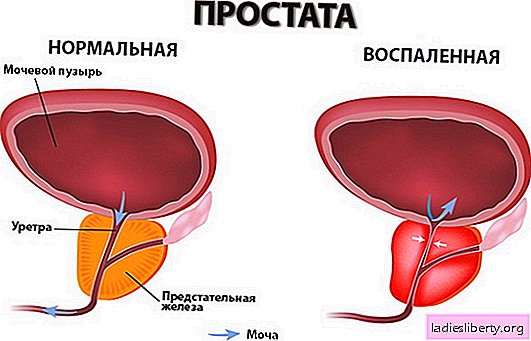
Adenoids are a serious disease that develops due to the proliferation of lymphoid tissue in the nasopharynx.
Let us consider in more detail the symptoms of adenoid inflammation and methods of treating such a condition.
The main causes of adenoid inflammation
Adenoids can be either a separate disease or proceed against the background of other pathologies accompanied by inflammation of the nasopharynx and oropharynx. In turn, it is necessary to highlight such causes and predisposing factors to the development of adenoids:
1. Pathological processes that occur during pregnancy and birth injuries can subsequently cause adenoids in the child.
2. Recently transferred laryngitis, sinusitis or tonsillitis, which caused severe inflammation and provoked an increase in adenoids in humans.
3. Lymphatic diathesis or allergic predisposition.
4. Prolonged colds that have not been cured.
5. Tonsillitis.
6. Influenza.
Symptoms and signs of inflammation of the adenoids
As you know, adenoids are a fairly long disease that gradually develops and affects many body systems. It manifests itself with such symptoms:
1. Hearing impairment.
2. Lack of oxygen, which provokes a delay in the mental and physical development of the child.
3. The appearance of irritability.
4. Tearfulness.
5. Sleep disturbance.
6. Headache.
7. Weakness.
8. Mouth breathing both in a dream and during the day.
9. The appearance of snoring.
10. Chronic runny nose, which can not be treated with conventional medications.
11. Nausea (occurs due to squeezing by the adenoids of the channels in the nasal cavity).
12. Rhinitis.
13. The formation of a special facial expression (adenoidal). It develops with a constantly open mouth and nasal congestion. Also because of this, malocclusion is possible.
Adenoid inflammation: treatment and diagnosis
To identify adenoids, you should undergo the following diagnostic procedures:
1. Finger examination in which the doctor will assess the general condition of the nasopharynx, the level of increase in adenoids and the neglect of inflammation. This examination is done by introducing the index finger into the patient's mouth.
2. Rhinoscopy - This is a procedure in which a doctor examines the nasopharynx with a small mirror. This method will help to see the size of the adenoids and the general condition of the nasal canals.
3. Endoscopic examination carried out using an endoscope. This method is considered the most reliable and painless for the patient.
General treatment for adenoids is divided into two separate categories:
• traditional drug treatment;
• surgical treatment (surgery).
Traditional (conservative treatment) is carried out with such indications in the patient's condition:
1. If the patient’s glands are slightly enlarged, but there is still no critical degree.
2. The patient has all the signs of severe inflammation (redness).
3. The patient has no gland disorders.
Typically, with medication, the following drugs are prescribed:
1. Antihistamines, which are aimed at removing allergic reactions. They protect against the formation of substances that can contribute to inflammation and swelling. Also, these drugs reduce mucus, pain and runny nose.
Most often, a medicine such as Diazolin is prescribed. The dosage and method of administration is selected for each patient individually, depending on the complexity and degree of the disease.
2. Antiseptic drugs for local use (Protagol, Collarlog).
3. Multivitamin medicines to strengthen immunity.
Also quite often apply warming and other physiotherapeutic procedures.
The duration of treatment with medications is also individual. Typically, the course of therapy is from two to three weeks. In this case, it is advisable for the patient to be in a hospital environment in order to be under constant medical supervision.
It is important to say that you should not independently treat a child. All medicines used must be agreed with your doctor.
Surgical treatment is indicated in such cases:
1. When drug therapy did not give the expected results (after 2-3 weeks of treatment, the patient does not show improvement).
2. When adenoids are greatly increased and completely block nasal breathing.
3. The patient experiences oxygen starvation.
4. Adenoids provoke the spread of pathogenic bacteria and infections (streptococci, staphylococci, etc.). This condition is especially dangerous, as it can cause inflammation, suppuration, etc.
5. Identification of adenoids of the third degree, which significantly interfere with normal human breathing. In addition, in this condition, the patient risks the formation of complications (hearing loss, the development of chronic respiratory diseases, etc.). For this reason, urgent surgical intervention is necessary.
6. Hearing impairment can occur when the adenoid grows, which will close the lumen of the auditory tube.
7. Sudden respiratory failure or the so-called nocturnal apoe. This is one of the most serious complications, in which the patient does not breathe for 10-20 seconds. It develops with the lowering of the root of the tongue.
In this state, the lower jaw drops, and the tongue itself can cause blockage of the larynx and suffocation. Moreover, if this happens at night, then the next morning the child may be lethargic and tired.
8. Identification of adenoids in adults. Despite the fact that previously adenoids were considered exclusively a childhood disease, sometimes it occurs even in a fairly mature age.
At the same time, a person needs an operation because, most likely, traditional drug therapy will not give the expected results. The operation will help to immediately solve the problem and prevent the development of complications.
Surgical intervention for adenoids is called adenotomy. It is done on a hospital and outpatient basis.
Before carrying out adentomy should be prepared. To do this, you need:
1. Pass tests (general analysis of urine and blood).
2. Re-examine your GP.
3. Perform an endoscopy.
4. Examined by a doctor so that he examined the adenoids and determined the volume of the upcoming operation.
Adenotomy is always done under local anesthesia. If the operation is not large, then doctors can limit themselves to short-term general anesthesia, in which the baby falls into sleep for a short time.
The procedure itself is carried out using a special device with a ring-shaped knife - an adenotope.
As for possible complications, the removal of adenoids almost always goes smoothly, without causing any undesirable consequences in the form of infection, inflammation or bleeding. A home child can leave a few hours after the operation.
In order for the wounds to heal faster, the patient should adhere to such tips after surgery:
1. Do not eat anything cold or hot.
2. Refuse to eat spicy or fatty foods.
3. Refuse physical activity.
4. It is better not to scream so that the lines do not strain your throat.
Direct contraindications for adenotomy are:
1. Violation of blood coagulation.
2. Hemophilia.
3. Leukemia.
4. Blood diseases.
5. Anemia.
6. Various pathologies of the cardiovascular system.
7. Enlarged thymus gland.
8. Acute infectious diseases (tonsillitis, pneumonia, bronchitis, etc.). In this case, the operation can be done three weeks after recovery.
Relative contraindications to surgery are:
1. Fungal infection of the nasopharynx.
2. The period of pregnancy or breastfeeding of the patient (due to stress, a woman can lose milk, and taking medications and anesthesia in a special situation is extremely undesirable).
3. Various pathologies of the renal system.
If the disease is in an unreleased form, then folk remedies will help to cope with it. The most effective of them are:
1. Drink a cocktail of honey, lemon juice and boiled water (in a glass of water 1 tsp. Honey and the same amount of juice).
2. Gargle with green tea three times a day.
3. Give the child grated garlic mixed with honey. It is advisable that he eat this after dinner.
4. Take a warm bath with the addition of essential oils.
5. Gargle with a decoction of chamomile, oak bark or thyme.
6. You can give your child warm milk with turmeric.
7. Treatment with honey and beetroot juice. To do this, mix these two ingredients in equal amounts and give the baby a teaspoon twice a day.
8. Mix chamomile, birch leaf and eucalyptus. Pour boiling water and insist for an hour. Gargle with a ready-made remedy throat twice a day.
Adenoid inflammation: treatment and prevention
In order to prevent the development of adenoids, you should adhere to the following doctor's recommendations:
1. Strengthen immunity in every way. To do this, it is advisable to play sports, do wiping with a wet towel, regularly conduct walks in the fresh air.
2. Eat a lot of fresh vegetables, fruits and their juices. It will enrich the body with vitamins and strengthen the immune system, especially in the autumn-spring period.
3. You should drink vitamin complexes from time to time.
4. If the child often suffers from a cold or rhinitis, then measures should be taken, since a prolonged course of inflammation in the nasopharynx can easily cause an increase in adenoids.
5. You can take medications that increase immunity. The best drugs in this group are Immunal and Ribomunil. Giving them to a child is allowed only after consulting a doctor.











